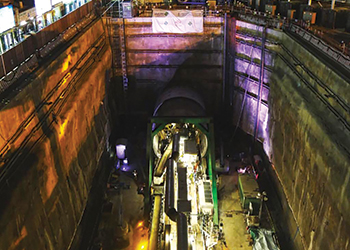
Contractors in Egypt are facing numerous challenges in an attempt to deliver an unprecedented number of projects that are under construction, according to the organiser of an upcoming construction forum in the country.
To highlight these challenges, the International Quality and Productivity Center (IQPC) Middle East has produced a report entitled “Contractors’ Challenges in Egypt”, providing an insight into the impact of the $92 billion of planned projects on the contracting industry as well as the shortage of material supplies due to the phenomenon of unlicensed housing.
The report also investigates the reasons behind the shortage of skilled construction professionals in the country in addition to the potential challenges that will be faced amidst the government’s tight schedules for the completion of their projects.
A number of major projects are in the offing in Egypt, says the report, including the expansion of the Suez Canal following the completion early last month of a $8.5-billion widening scheme, the SCZ (Suez Canal Zone), the $45-billion ‘Golden Triangle’ mining area development and an entirely new capital city east of Cairo.
In addition, the underinvested housing sector needs to produce millions of units to cater to Egypt’s growing population, the most populous in the Arab world.
“More than $92 billion has been pledged for these projects by various international governments, private commercial enterprises and international lenders such as the World Bank,” says a white paper released in the run-up to the Egypt Construction Forum and Awards, which will be held in Cairo, Egypt, later this year.
However, contractors need to be overcome significant challenges and obstacles, following the political upheaval over the past few years, it says.
Some of these challenges include:
• Building material shortages: According to Maria Golia of the Middle East Institute, informal (unlicensed) housing in Egypt’s ashwa’iyyat (unplanned areas) increased by at least two million flats between 2012 and 2014. “Especially since 2011, in the absence of state supervision, construction of informal housing has increased to such an extent that licensed developers have encountered shortages of building materials for their projects,” she says.
Approximately 20 million of Egypt’s inhabitants are estimated to live in unlicensed housing and the further expansion of unplanned areas means that more resources are being illegally utilised in response to further urbanisation, making it difficult for contractors to source the appropriate building materials in a timely manner, the report points out.
• Workforce shortage: While there is currently a high availability of unskilled labour for construction contractors to tap into and the costs are fairly inexpensive when compared with neighbouring countries, the same cannot be said of skilled or semiskilled workforce availability, says the report.
This lack of skilled construction professionals (engineers, site foremen, project managers, etc) is due to a number of factors, though the most critical are education and pay.
• Funding: While large construction projects in Egypt usually find less difficulty securing funding from foreign sources or banks following the financial guidelines laid down by the Central bank of Egypt (CBE) the same cannot be said for Egyptian small and medium enterprises (SMEs) which are struggling in this area, says the report.
According to a recent survey of the 15,000 SME enterprises registered with the Egyptian Federation for Construction and Building Contractors (EFCBC), 12,000 are experiencing significant difficulty in obtaining the funds required for their projects. Their efforts are hampered by a lack of confidence from the banks in the feasibility of the projects of construction SMEs and a lack of clear financial guidelines and requirements for SMEs to follow.
“However, despite of the risks and uncertainties that affect the industry, its prospects have not looked better in decades. The construction of massive residential and commercial mega projects such as the SCZ development and the new capital east of Cairo is turning Egypt into a hive of construction activity.
The ambition underpinning these construction plans – as well as the level of foreign investment – is certainly impressive, but efficient project delivery will be crucial in sustaining the momentum of this construction boom. With the appropriate aid in sourcing quality materials, labour, equipment and funding, construction contractors can look forward to a return to productivity and profits that match or even surpass pre-revolution levels,” concludes the report.
The Egypt Construction Forum and Awards, organised by IQPC, will be held at the Fairmont Heliopolis & Towers, Cairo from November 24 to 25 and will see the participation of Arab Contractors, CCC, Besix, Housing & Building National Research Centre, Petrojet, and Emaar Misr among others.





















_0001.jpg)


.jpg)
















.jpg)








.jpg)



